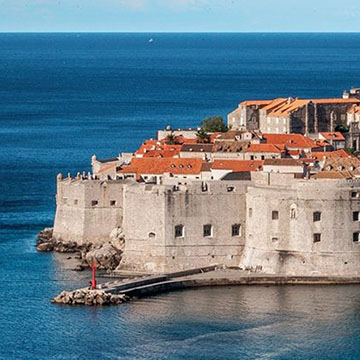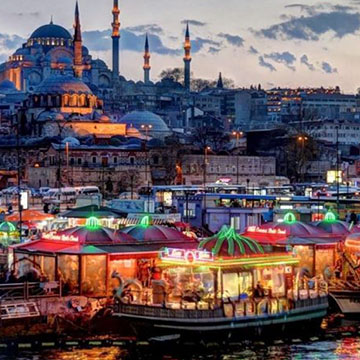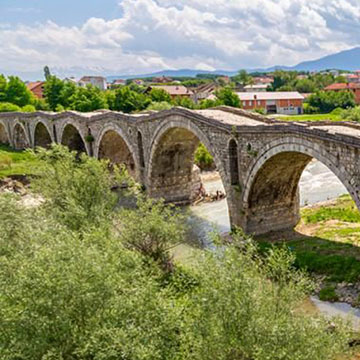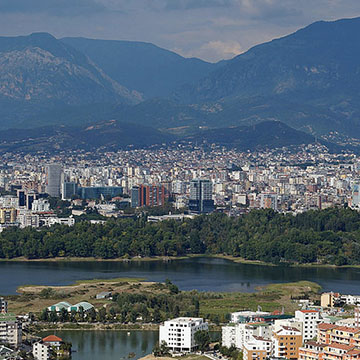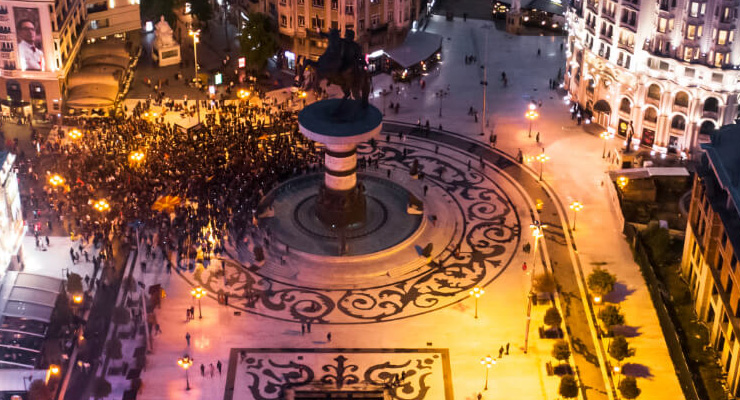
Macedonia
The official name, the Republic of Macedonia, is a Balkan country located in Southeast Europe. The country gained its independence in 1991 by separating from the Socialist Federal Republic of Yugoslavia. Macedonia shares borders with Serbia and Kosovo to the north, Albania to the west, Greece to the south, and Bulgaria to the east.
In 1993, the country became a member of the United Nations but faced a name dispute with Greece. Due to this crisis, Macedonia is recognized by the European Union, the Council of Europe, and NATO under the name "Former Yugoslav Republic of Macedonia" (FYROM). The country covers an area of 25,713 square kilometers and is home to 2 million people. After leaving Yugoslavia, the country faced economic challenges, with its economy primarily based on agriculture. However, in recent years, industrial development has started across the country.
Capital, Cities, and Regions of Macedonia
Macedonia is divided into statistical regions and municipalities. Skopje, Eastern Macedonia, Northeastern Macedonia, Pelagonia, Polog, Southeastern Macedonia, Southwest Macedonia, and Vardar are the statistical regions. The capital and the largest city, Skopje, is home to over 500,000 people. Other important cities include Bitola, Kumanovo, Kavadarci, Prilep, Gostivar, and Ohrid.
Where is Macedonia?
Macedonia is a landlocked country, bordered by Montenegro to the northwest, Serbia to the north, Bulgaria to the east, Greece to the south, and Albania to the west. The country, with an area of 25,713 square kilometers, is known for the Vardar River and mountains exceeding 2,000 meters. Additionally, Macedonia has lakes such as Ohrid, Prespa, and Doyran located at intersections with Albania and Greece.
When to Visit Macedonia?
The best time to visit Macedonia is during the warmer months when temperatures rise. The summer months are hot and dry, with an average temperature of 23 degrees Celsius, reaching 30 degrees Celsius in July, the hottest month. June and August evenings may require a light jacket. Winters in the country are snowy and long.
June to mid-October is a suitable period for travel when temperatures become favorable. The best seasons to explore the country's natural beauty and historical sites are summer and autumn. Rainfall is more common in spring and autumn compared to summer and winter, which receive less precipitation.
Macedonian Culture
Macedonia is a multicultural Balkan country with ethnic and religious diversity. Over the years, Muslims and Christians, Macedonians, Albanians, and Turks have lived together under the rule of different empires. However, the collapse of the Ottoman Empire and the Yugoslav Socialist Federal Republic led to ethnic and religious diversity issues. Tensions between Albanian-Muslim minority groups and Macedonian security forces in 2011 and 2012 escalated into conflicts.
Travelers to Macedonia should be sensitive when discussing ethnic composition, politics, and the economy. Ethnic differences are evident in certain areas, with the Vardar River dividing Skopje, primarily inhabited by Albanians on one side and Turks and Christians on the other. Macedonia is a small, mountainous country where different regions have distinct traditional costumes, although these are no longer worn in daily life. Traditional costumes can still be seen during local festivals and important events.
Macedonian Cuisine
Macedonian cuisine encompasses flavors from the Balkans, the Mediterranean, and the Middle East. The use of abundant vegetables, greens, and fruits is prevalent, with fresh herbs from the mountains also incorporated into dishes. Dairy products, wines, and local spirits such as "rakiya" are widely consumed. Macedonian cuisine shares similarities with Turkish cuisine, featuring dishes like musaka, burek, sarma, and turli tava. Kebapchinja refers to kebabs.
Ajvar, a sauce made from red peppers, chili peppers, and garlic, is common for breakfast. Skopska salad consists of tomatoes, cucumbers, onions, and white cheese. Pastrmajlija is a type of pie made with cured meats, and tavce gravce, made from beans, onions, peppers, and tomatoes, is one of the most well-known dishes. Other notable dishes include kompir mandza, kacamak, mekici, pindjur, and popara.
Souvenirs from Macedonia
The Republic of Macedonia offers various shopping options, from historical Ottoman bazaars and markets to modern shopping venues. Skopje, Tetovo, Ohrid, and Bitola are famous for their bazaars and markets. These places offer everything from dried vegetables to counterfeit bags and sunglasses of famous brands.
Ohrid, with many jewelry stores, is a suitable destination for jewelry enthusiasts. Paintings reflecting Macedonian Orthodox art can also be attractive gift options for visitors.
Macedonian Festivals
Manaki Brothers International Cinematographers' Film Festival
Held in Bitola, Macedonia, this festival awards cinema prizes in memory of the Manaki Brothers, who introduced cinema to the Ottoman Empire and the Balkans. The competition, held since 1979, takes place every September.
Balkan Folklore Festival
This festival started in Ohrid, Macedonia, in 1962. As a member of the UNESCO Council for Folklore Art and Festivals, the festival represents folklore groups and artists from the Balkans and neighboring countries. Over 42,000 participants from various countries have attended the festival. In addition to dance and song competitions, the festival hosts exhibitions and seminars.
Galicnik Wedding
Held every July in the village of Galicnik on St. Peter's Day, this traditional wedding ceremony is celebrated as a three-day festival. Couples in local costumes dance, sing, eat, and drink, preserving the centuries-old ceremony.
Ohrid Summer Festival
Held in Ohrid, Macedonia, from July 12 to August 20 every year, this festival began with a concert at St. Sophia Church on August 4, 1961. The festival has hosted some of the most important musicians and choirs from Europe and around the world since 1961.
Other festivals in Macedonia include the International Ancient Theatre Festival, Ustrumca Carnival, Interfest - Classical Music Festival, and the Skopje Jazz Festival.
Holidays/Feasts/Important Days in Macedonia
- Orthodox Christmas (January 7)
- Labor Day (May 1)
- Easter (May 1-2)
- Day of Saints Cyril and Methodius (May 24)
- Ramadan Bayram (July 5)
- Republic Day (August 2)
- Independence Day (September 8)
- Day of the Macedonian Revolution (October 11)
- Macedonian Struggle for National Liberation Day (October 23-24)
- St. Clement of Ohrid Day (December 8)
Climate and Weather in Macedonia
Macedonia experiences various climate types in different regions. Despite its location between the Aegean and Adriatic Seas, the country is surrounded by mountains, resulting in limited sea influence. Places like Gevgelija, Ustrumca, Valandovo, Doyran, and Radovis, including the Vardar and Ustrumca cities, have a Mediterranean climate.
Regions like Demir Kapı and Gevgelija experience the highest temperatures, especially in July and August, with temperatures reaching 40 degrees Celsius. Mountainous areas have a continental climate, with significant temperature differences between day and night. During summer, daytime temperatures hover around 30 degrees Celsius but can drop to below 20 degrees Celsius at night. The Baba and Sar Mountains in the southwest and northwest of Macedonia, respectively, are cold areas. Cold air waves from the Balkans, especially in winter, and cold air waves from Russia can bring temperatures below freezing.
A Brief History of Macedonia
Macedonia has a history dating back to ancient times. The region's sovereignty passed from the Persians to Alexander the Great, from Alexander the Great to the Roman Empire, and finally to the Ottoman Empire. The area, which remained under Ottoman rule for 600 years and constituted a significant part of Rumelia, became one of the Yugoslav Socialist Federal Republic countries by the 20th century. However, it could only declare its independence in 1991. The country still bears traces of its rich cultural, ethnic, and social past.
Economy of Macedonia
The Republic of Macedonia faced significant economic challenges after the dissolution of Yugoslavia. Although the country gained independence in 1991, it struggled to establish a balanced economic order due to infrastructure deficiencies and the Greek embargo. By the 2000s, the country still dealt with high levels of unemployment, poverty rates, and external migration.
Languages Spoken in Macedonia
Macedonian, a South Slavic language, is the country's official language. It shares similarities with Bulgarian. Besides Macedonian, minority languages are spoken at rates of up to 20%. Albanian, Turkish, Romani, Serbian, and Bosnian are among the main minority languages.


